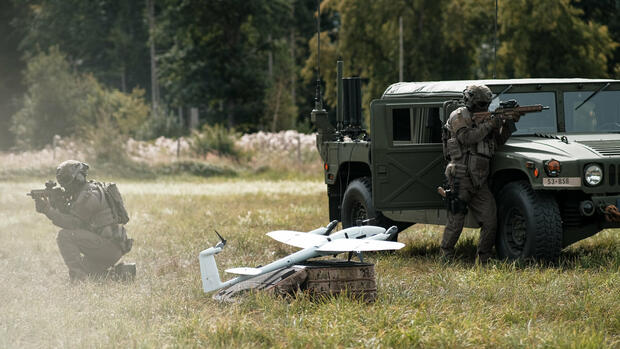The Vector drone was developed for military purposes: Ukrainian soldiers are already using it, and a special unit of the US armed forces has now placed an order.
(Photo: Quantum Systems)
Dusseldorf Special forces of the US Navy want to use drones from Quantum Systems for reconnaissance missions in the future. The Ministry of Defense in Washington has awarded the Munich start-up a contract worth 20 million dollars, as the ministry recently announced. According to Handelsblatt information, 100 Vector drones are to be delivered.
The unarmed reconnaissance drones have a wingspan of 2.80 meters, can take off and land vertically and are equipped with night vision and thermal imaging cameras. After take-off, they fly almost silently.
According to founder and company boss Florian Seibel, the special forces could use them to explore an area at night from a rubber dinghy. The Pentagon has been testing the drones for the past few months.
Now the founder hopes to find more users within the US armed forces and beyond. “We assume that the beacon effect of this order on other procurement authorities worldwide will be great,” said Seibel.
The procurement for the marine special unit Marsoc runs through a program with which the US Department of Defense wants to bring new technologies into the armed forces more quickly. Start-ups and companies that do not traditionally belong to the defense industry are also to be promoted.
Reconnaissance drone tested in Ukraine
Quantum Systems is now one of Germany’s best-known developers of small unmanned aerial systems, which are often referred to as UAS. The company also develops civilian drones, but has increasingly positioned itself in the defense sector since the beginning of the Russian war of aggression against Ukraine.
It has been financed with venture capital since it was founded in 2015. For many investors, one of the funding conditions is that Quantum Systems doesn’t develop weapons or armed drones.
In recent months, the Vector drones have been tested in Ukraine. Ukrainian soldiers use them to spot Russian artillery and troop movements with video recordings – and to hit their targets. At the front, soldiers no longer face each other directly, but are often many kilometers apart.
Quantum Systems has also just received another major order from the Ukraine. Another 300 drones are to be delivered by early 2024, as the Handelsblatt learned in advance. That’s about twice as many as have been ordered so far.
Drones must survive in electronic combat
The high demand is also likely to be related to losses. Among other things, Russian soldiers repeatedly succeed in electronically jamming drones from different manufacturers and taking them out of the sky. “Russia is very good at electronic warfare,” said Quantum boss Seibel.
The civil navigation satellite system GPS is easy to jam because only weak signals are sent in fixed sequences. That is why military drones are being developed in such a way that they can be piloted over different radio frequency bands. During use, you then switch between the bands. However, the disruption of radio signals, known as “jamming”, is also risky for enemy soldiers because sources of interference are easy to locate.
The drones for Ukraine are financed by the federal government. The costs should amount to almost 57 million euros.
More: 105 drones for Ukraine – Munich start-up receives another order worth millions
